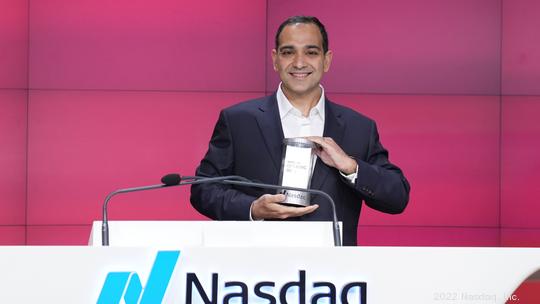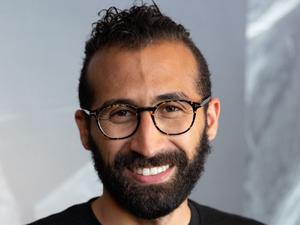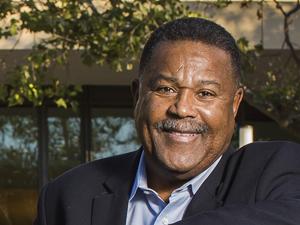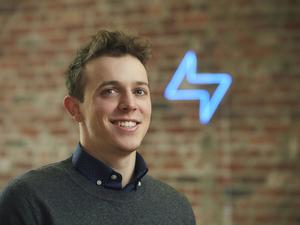
When Keyvan Mohajer began working on what would become voice assistant technology while a PhD student at Stanford University nearly 20 years ago, he never predicted how far his ideas would take him personally.
But he had a vision of how far those ideas themselves could go. You might say it was a futuristic, interstellar vision.
"I asked, what do they have in 'Star Trek' that we don't have?" Mohajer told the Business Journal Thursday. "They talk to robots, they talk to computers ... I thought, that will happen for sure in my lifetime, and I want to be the one to make it happen."
We may not yet have spaceships that can travel across the galaxy a la the U.S.S. Enterprise and Captain Kirk, but Mohajer's vision has come a lot closer to reality over the last two decades. And SoundHound AI Inc., the company he co-founded while still at Stanford, has helped to make that happen.
This week, SoundHound took a big step as a company, one that could help spread the use of artificial intelligence-powered voice assistants, like the one it's developed. The Santa Clara business went public via a merger with a special purpose acquisition company, or SPAC.
That route to Wall Street was exceedingly popular last year, with record number of companies going public via such mergers. But with the shares of many of those companies trading well below their debut prices and many failing to live up to the rosy financial forecasts they gave investors before their combinations, the market has soured on such deals in recent months. SoundHound's combination was one of only a handful of completed deals involving Bay Area companies this year.
SPAC mergers are not for everyone, said Mohajer, who is SoundHound's CEO. The SPAC frenzy of the last two years encouraged some less-qualified startups to go public that way, he said.
By contrast, "SPACs actually were perfect for us," he said. As he and his team considered the option, they figured "it would accelerate going public and help us get more resources, and help us get where we want to go faster," he added.
SoundHound's shares have fallen since it went public
To be sure, the market reacted similarly to SoundHound's debut as it has to other companies that have gone public in SPAC deals of late.
On their last day of trading Wednesday, shares of Archimedes Tech SPAC Partners Co., SoundHound's merger partner, closed at $8.18 a piece. After taking over Archimedes' listing Thursday, SoundHound's shares (Nasdaq:SOUN) initially rose as high as $10.50 a piece before falling sharply and closing the day at $7.50 each. On Friday, they were down another 14% in midday trading, falling to $6.44 a piece.
In addition to investors souring on SPAC mergers, such deals have become less attractive for the operating companies involved. One of the unique features of such blank-check companies is that, before their mergers, their stockholders can trade in their shares for the cash originally paid for them, typically about $10 a piece.
When investors redeem shares in this way, the SPACs have less capital to hand over to their merger partners. In many recent SPAC deals, investors have been asking for refunds on 80% to 90% of the blank company's shares, reducing the capital they can directly contribute to their partners by a corresponding amount.
Most SPAC deals include purchases of shares by institutional or affluent individual investors in private investments that are timed to coincide with the mergers. To compensate for the growing number of redemptions by everyday stockholders, many SPACs have convinced such deep-pocketed investors to increase their private investments.
In SoundHound's case, the company and Archimedes have not yet disclosed how many of the latter's shares were redeemed prior to the combination. But earlier this month, the blank-check company convinced another big investor to buy shares, boosting the private investment portion of the deal from $111 million to $113 million.
Mohajer declined to say how much SoundHound got from the merger in total. But the company was hoping to get at least $100 million from the deal, he said. So, the private investment — also known as a PIPE, or private investment in public equity — was crucial to its success, he said.
SoundHound expects big contracts to boost its revenue
Much of that money came from new investors, Mohajer said, adding he was "very happy" with the amount SoundHound ended up raising.
"We're so proud that we raised a very big PIPE," Mohajer said. He continued: "That allowed us to do the deal."

One of the reasons SoundHound was able to attract a large amount of private investments was because of its track record of success, he said. SoundHound's technology is proven, its service has been adopted by customers including Netflix Inc. and Mercedes-Benz Group AG, and it has a solid business model, he said.
SoundHound's rivals include Amazon's Alexa technology and Apple's Siri. But unlike those companies, SoundHound doesn't reserve its voice assistant for use in its own product or those of favored partners. Instead, it's built a business around licensing its technology for use in other companies' products.
The company expects to see big business in coming years from its multi-year contracts with existing customers, Mohajer said. Those deals range in value from the millions of dollars to more than $100 million, he said. Thanks to those contracts, SoundHound expects its sales to grow from $30 million this year to $110 million next year and $1.2 billion in 2026.
The revenue from these contracts also means that SoundHound expects to become profitable by 2024 — at least if you exclude certain expenses.
Excited about his company's future, Mohajer and his wife held their 20-month-old daughter, Juliette, up at the Nasdaq podium on Thursday so she could ring the storied bell as they celebrated SoundHound's Wall Street debut.
"This is not an exit for us: it's a new beginning," he said. "We think voice AI is the next major disruption in computing. There will be billions of devices around you that you can talk to, and we want to power all of that."








